Lecture 21: A Bounded Queue
Reminder
Proof of Concept for final project due this Friday.
Overview
- Testing Previous Queues
- A Bounded Queue
- Stacks
Previously
- Unbounded Queue with Locks
- lock
enqanddeqmethods
- lock
- Lock-free Unbounded Queue
- use
AtomicReferenceforhead,tail,next - use
compareAndSetto validate & update atomically - update
head/tailproactively- guard against incomplete
deq/enq
- guard against incomplete
- use
Lock-free Dequeue Method
public T deq() throws EmptyException {
while (true) {
Node first = head.get();
Node last = tail.get();
Node next = first.next.get();
if (first == head.get()) {
if (first == last) {
if (next == null) {
throw new EmptyException();
}
tail.compareAndSet(last, next);
} else {
T value = next.value;
if (head.compareAndSet(first, next))
return value;
}
}
}
}
Testing our Queues
Bounded Queues
- Both previous queues were unbounded
- Sometimes we want bounded queues:
- have limited space
- want to force tighter synchronization between producers & consumers
How can we implement a bounded queue (with locks)?
One Option
Keep track of size!
- Start with our
UnboundedQueue- lock
enqanddeqmethods
- lock
- Add a
final int capacityfield - Add an
AtomicInteger sizefield- increment upon
enq - decrement upon
deq
- increment upon
- Make sure
size <= capacity
Why should size be atomic?
Enqueue Method
- acquires
enqLock - if
sizeis less than capacity- enqueue item
- increment size
- release lock
- otherwise
- throw exception? (total method)
- wait until
size < capacity? (partial method)
Dequeue Method
- acquires
deqLock - if
sizeis greater than0- dequeue item
- decrement size
- release lock
- otherwise
- throw exception? (total method)
- wait until
size > 0? (partial method)
An Unexceptional Queue
Suppose we don’t want to throw exceptions
- Full/empty queue operations are expected, not exceptional
- Queue should handle these cases by having threads wait
Question: How might we implement this behavior?
Enqueue with Waiting
public void enq (T value) {
enqLock.lock();
try {
Node nd = new Node(value);
while (size.get() == capacity) { }; // wait until not full
tail.next = nd;
tail = nd;
} finally {
enqLock.unlock();
}
}
A Problem?
This is wasteful!
while (size.get() == capacity) { }; // wait until not full
The thread:
- Acquires lock
- Fails to enqueue while holding lock
- Uses resources to repeatedly check condition
size.get() == capacity
What if it takes a while until the queue is not full?
A More Prudent Way
The following would be better:
- enqueuer sees that
size.get() == capacity - enqueuer temporarily gives up lock
- enqueuer passively waits for the condition that
size.get() < capacity- not constantly checking
- dequeuer sees that enqueuers are waiting
- after dequeue, dequeuer notifies waiting enqueuers
- enqueuer acquires lock, enqueues
A Waiting Room Analogy
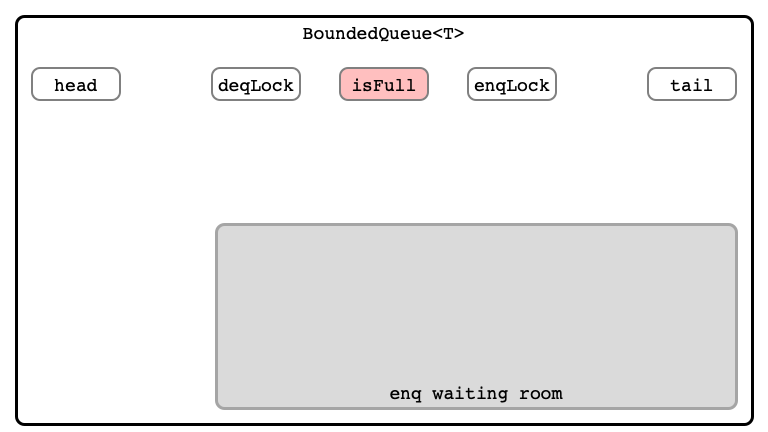
Queue Full

Enqueuer Arrives, Acquires Lock
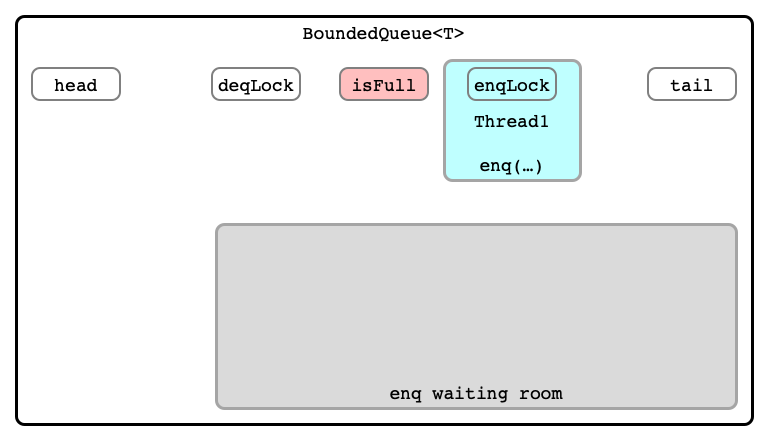
Enqueuer Sees Full, Waits
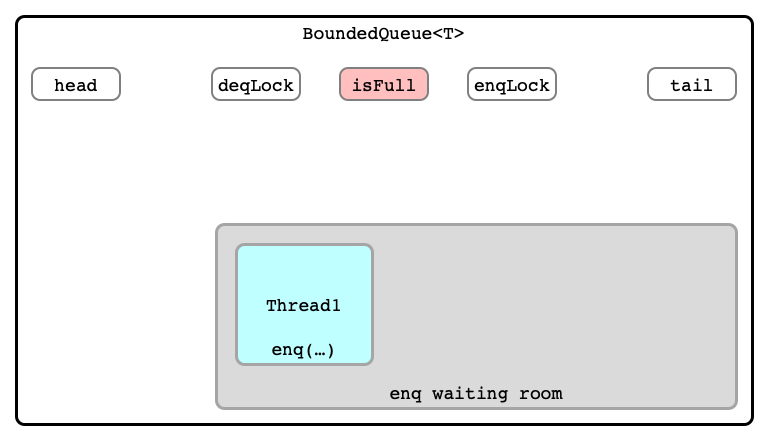
Enqueuer Arrives, Acquires Lock
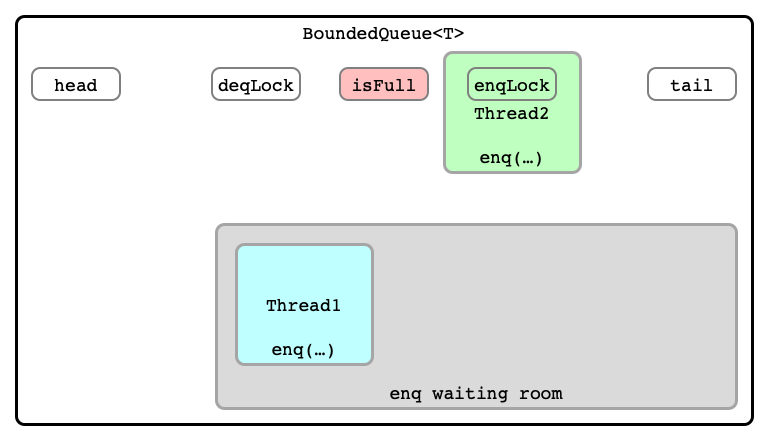
Enqueuer Sees Full, Waits
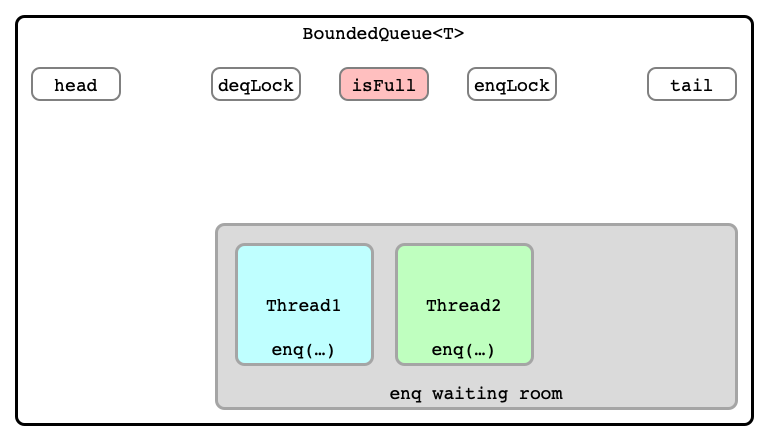
Dequeuer Arrives, Sees Full, Dequeues
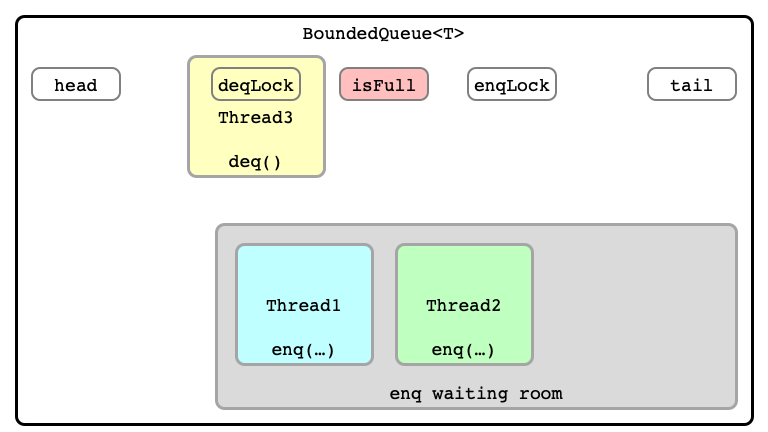
Dequeuer Announces No Longer Full
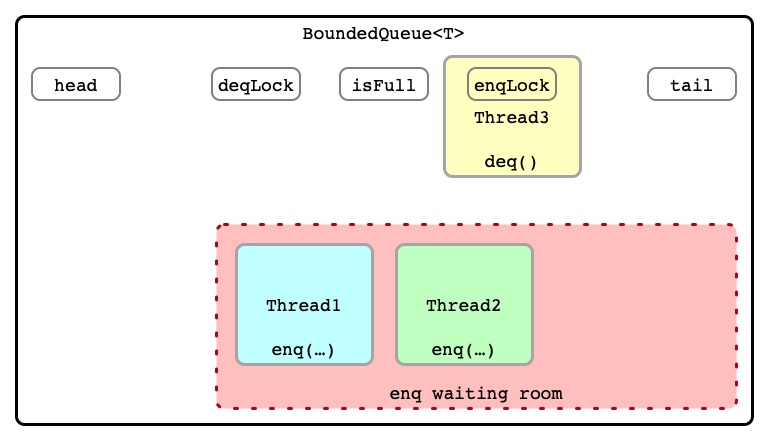
Enqueuers Leaving Waiting Room
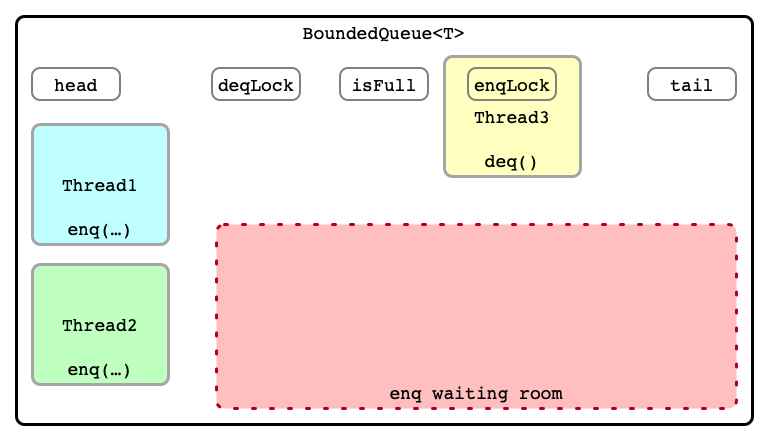
Dequeuer Releases Lock
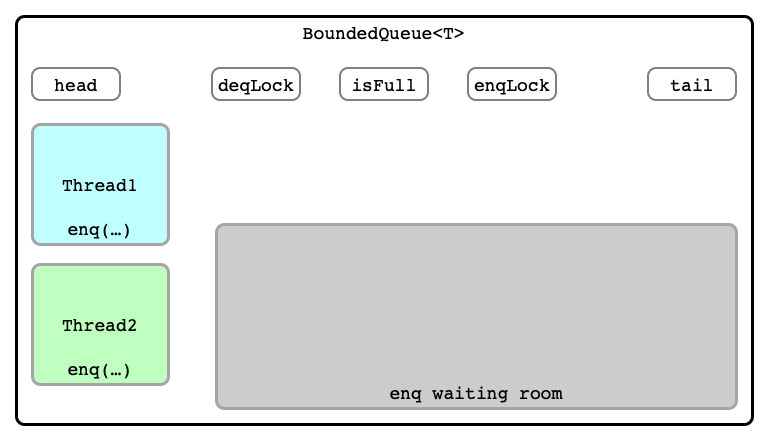
Enqueuer Locks; Enqueue Ensues
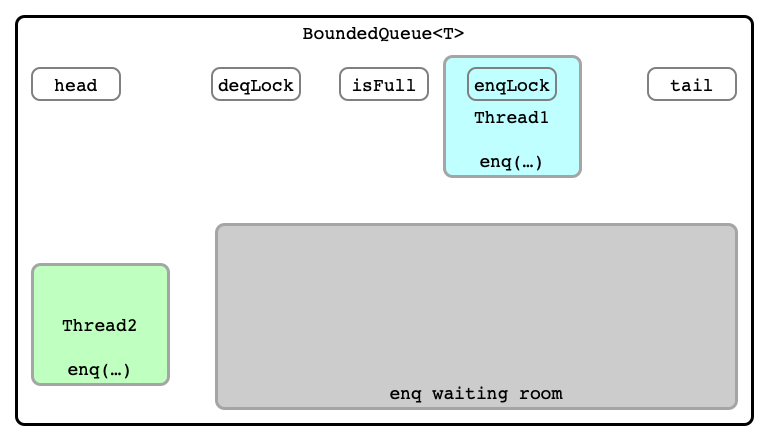
The Lock and Condition Interfaces
The Lock interface defines a curious method:
-
Condition newCondition()returns a new Condition instance that is bound to this Lock instance
The Condition interface
-
void await()causes the current thread to wait until it is signalled or interrupted -
void signal()wakes up one waiting thread -
void signalAll()wakes up all waiting threads
Improving our Queue
Define condition for enqLock
notFullCondition
When enqueuing to a full queue
- thread signals that it is waiting
- need a flag (
volatile boolean) for this
- need a flag (
- thread calls
notFullCondition.await()- waits until
notFullConditionis satisfied
- waits until
When Dequeueing
When dequeueing
- thread checks if thread is waiting
- checks flag for this
- if so, after dequeue, dequeuer calls
notFullCondition.signalAll()- signals that queue is no longer full
(Similar: notEmptyCondition for deq method)
Making a BoundedQueue
public class BoundedQueue<T> implements SimpleQueue<T> {
ReentrantLock enqLock, deqLock;
Condition notEmptyCondition, notFullCondition;
AtomicInteger size;
volatile Node head, tail;
final int capacity;
public BoundedQueue(int capacity) {
this.capacity = capacity;
this.head = new Node(null);
this.tail = this.head;
this.size = new AtomicInteger(0);
this.enqLock = new ReentrantLock();
this.notFullCondition = this.enqLock.newCondition();
this.deqLock = new ReentrantLock();
this.notEmptyCondition = this.deqLock.newCondition();
}
public void enq(T item) { ... }
public T deq() { ... }
class Node { ... }
}
Enqueueing
public void enq(T item) {
boolean mustWakeDequeuers = false;
Node nd = new Node(item);
enqLock.lock();
try {
while (size.get() == capacity) {
try {
// System.out.println("Queue full!");
notFullCondition.await();
} catch (InterruptedException e) {
// do nothing
}
}
tail.next = nd;
tail = nd;
if (size.getAndIncrement() == 0) {
mustWakeDequeuers = true;
}
} finally {
enqLock.unlock();
}
if (mustWakeDequeuers) {
deqLock.lock();
try {
notEmptyCondition.signalAll();
} finally {
deqLock.unlock();
}
}
}
Dequeueing
public T deq() {
T item;
boolean mustWakeEnqueuers = false;
deqLock.lock();
try {
while (head.next == null) {
try {
// System.out.println("Queue empty!");
notEmptyCondition.await();
} catch(InterruptedException e) {
//do nothing
}
}
item = head.next.item;
head = head.next;
if (size.getAndDecrement() == capacity) {
mustWakeEnqueuers = true;
}
} finally {
deqLock.unlock();
}
if (mustWakeEnqueuers) {
enqLock.lock();
try {
notFullCondition.signalAll();
} finally {
enqLock.unlock();
}
}
return item;
}
Testing the Queue
For Your Consideration
What if we want to make a lock-free bounded queue?
- Can we just add
sizeandcapacityfields to ourLockFreeQueue?
Stacks
Recall the Stack
Basic operations
-
void push(T item)add a new item to the top of the stack -
T pop()remove top item from the stack and return it- throw
EmptyExceptionif stack was empty
- throw
Linked List Implementation
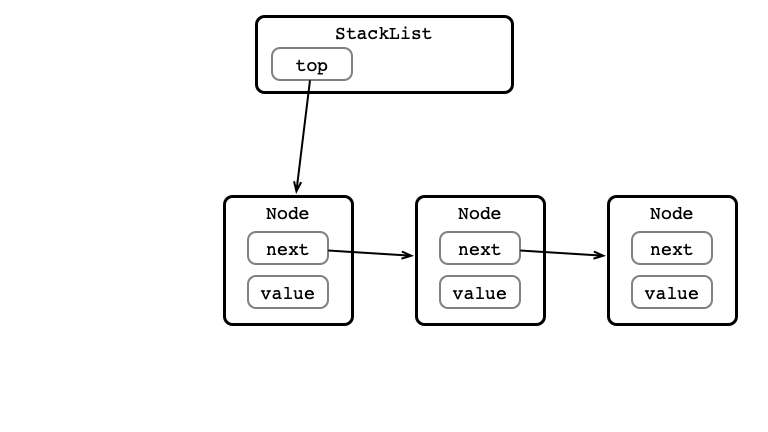
push() Step 1: Create Node
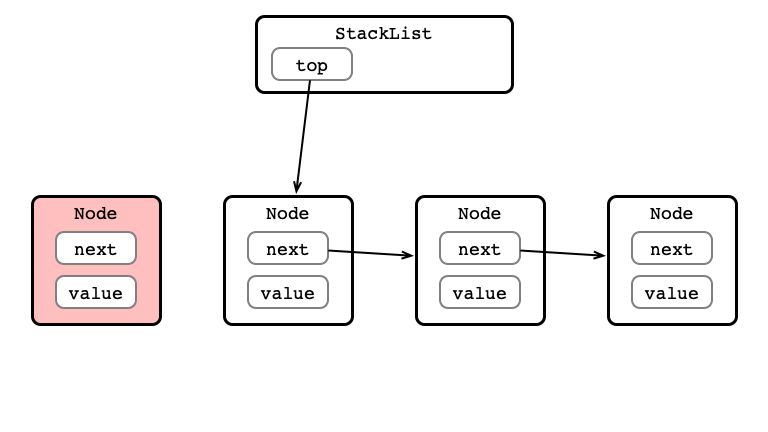
push() Step 2: Set next
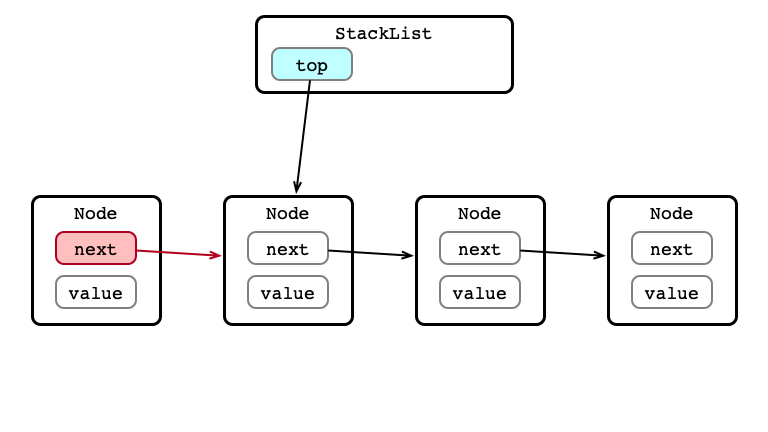
push() Step 3: Set head
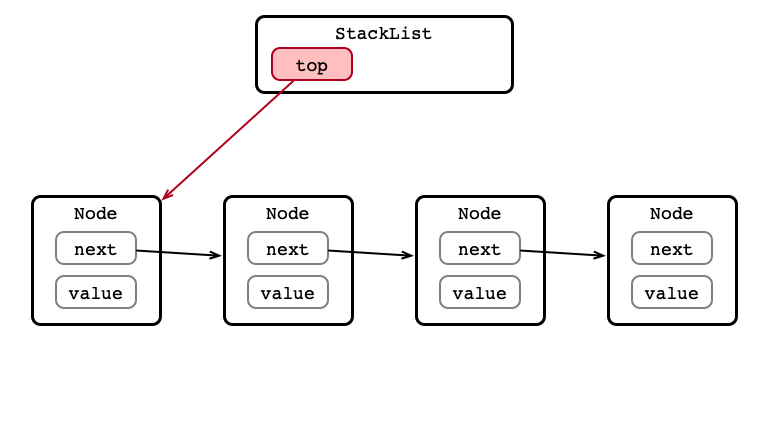
push() Complete
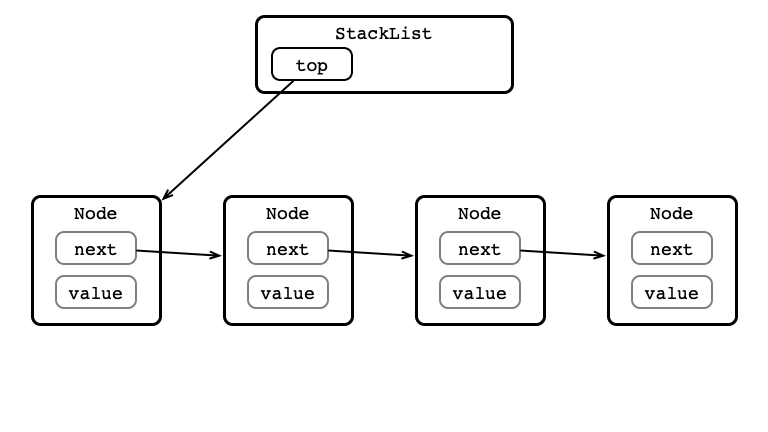
pop()?

pop() Step 1: Store value
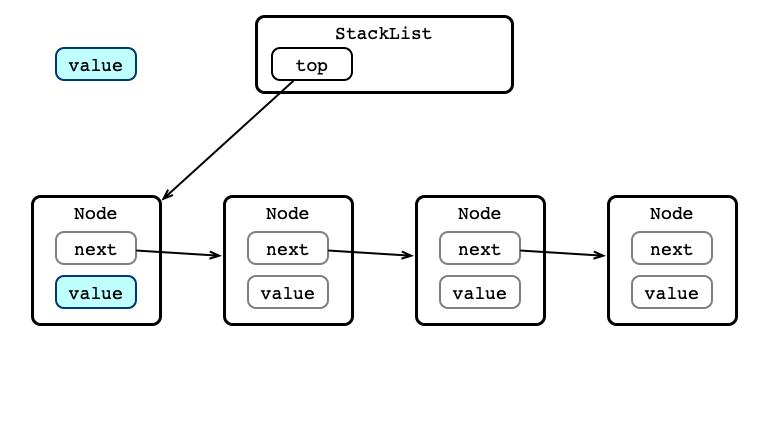
pop() Step 2: Update head
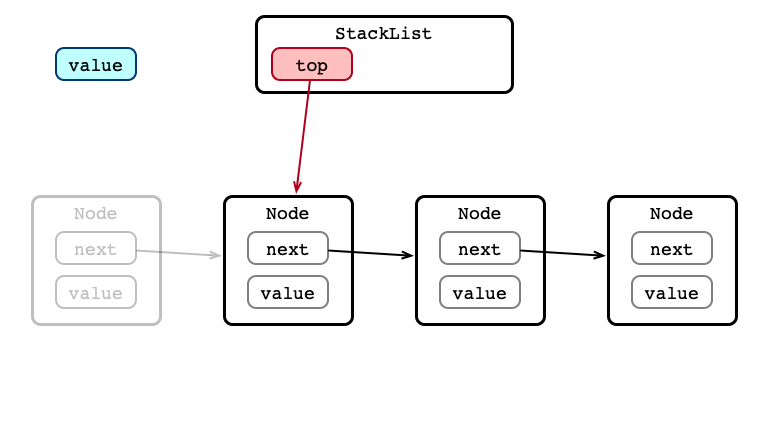
pop() Step 3: Return value
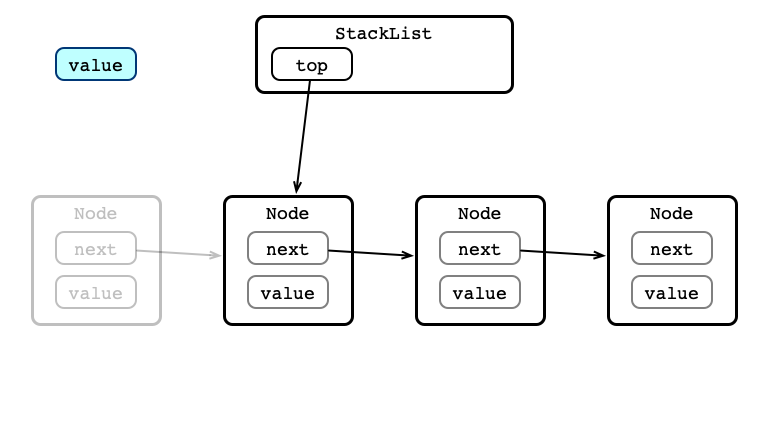
Concurrent Stack
With locks:
- Since all operations modify
head, coarse locking is natural choice
Without locks?
A Lock-free Stack
Use linked-list implementation
- Logic is simpler than queues’ because all operations affect same node
- Idea:
- store
topas anAtomicReference<Node> - use
compareAndSetto modifytop- success, or retry
- store
- Unlike queue:
- item on top of stack precisely when
toppoints to item’sNode
- item on top of stack precisely when
Implementing the Lock-Free Stack
public class LockFreeStack<T> implements SimpleStack<T> {
AtomicReference<Node> top = new AtomicReference<Node>(null);
public void push(T item) {...}
public T pop() throws EmptyException {...}
class Node {
public T value;
public AtomicReference<Node> next;
public Node(T value) {
this.value = value;
this.next = new AtomicReference<Node>(null);
}
}
}
Implementing push
public void push(T item) {
Node nd = new Node(item);
Node oldTop = top.get();
nd.next.set(oldTop);
while (!top.compareAndSet(oldTop, nd)) {
oldTop = top.get();
nd.next.set(oldTop);
}
}
Implementing pop
public T pop() throws EmptyException {
while (true) {
Node oldTop = top.get();
if (oldTop == null) {
throw new EmptyException();
}
Node newTop = oldTop.next.get();
if (top.compareAndSet(oldTop, newTop)) {
return oldTop.value;
}
}
}
Sequential Bottleneck
Modifying top
- No matter how many threads,
push/poprate limited bytop.compareAndSet(...) - This seems inherent to any stack…
… or is it?
Elimination
Consider several concurrent accesses to a stack:
- T1 calls
stk.push(item1) - T2 calls
stk.push(item2) - T3 calls
stk.pop() - T4 calls
stk.push(item4) - T5 calls
stk.pop() - T6 calls
stk.pop()
Trick Question. What is the state of stk after these calls?
What do we need the stack for?
Match and exchange!
Cut out the middleperson!
A Different Strategy
- Attempt to
push/popto stack- if success, good job
- If attempt fails, try to find a partner
- if
push, try to find apopand give them your value - if
pop, try to find apushand take their value
- if
Next time: implement an exchange object to facilitate this